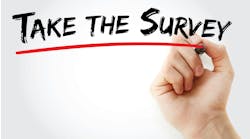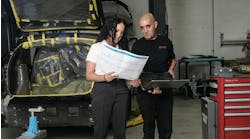No one has a crystal ball that can specifically proclaim the intricacies of what promises to be a complex future in collision repair. Wouldn’t it be nice if someone did, though?
For now, we will just have to take what we can get. Luckily, some components of the abstract “future” may be easier to anticipate than others.
The crux of adequate preparation starts at the source with quality training opportunities. To put it bluntly, there simply is no future for this industry if there are no technicians, and those technicians deserve access to education that keeps not only the industry in mind, but the landscape of tomorrow as well.
In practice, this may be easier said than done. In fact, it most definitely is. But that should not sway those within the industry from trying. Take, for instance, the Inter-Industry Conference on Auto Collision Repair.
They are a well established not-for-profit organization that provides access to information and skill sets that help provide complete quality repair care, and they have found themselves stepping up to the challenge.
I-CAR was recently crowned the first organization within the collision repair industry to receive accreditation from the International Accreditors for Continuing Education and Training. This is no small feat, and means that their endeavors towards industry education have been given a big stamp of approval.
But according to I-CAR CEO John S. Van Alstyne, it’s about so much more than that.
“It’s not just having the logo that we can promote.” he says to FenderBender of I-CAR’s choice to embark on their journey to certification. “It really was about the underlying capabilities that we were able to bring to the table in terms of designing, developing, building and delivering our educational programming.”
For one, this is not an accreditation that came easily. I-CAR certainly had to put in the work up front. “We went through kind of an exhaustive internal self-assessment and audit process to make sure that we were ready to be accredited by the external auditors.” Says Van Alstyne.
In the end, the hard work paid off. They completed that process at the end of 2021 and IACET assessed them in Q1 of 2022. I-CAR passed the audit on their first try. However, in the words of Van Alstyne, it isn’t simply a “one and done” process. I-CAR will have to continue to perform to the standards set in place by IACET on an ongoing basis in order to maintain their accreditation status.
But Van Alstyne doesn’t anticipate excellence being an issue, not now or in the future. “It’s not just the IACET accreditation,” He shares. “We do that because that’s one of our core values. That’s how we run the place. IACET is just an affirmation of that.”
For I-CAR, along with affirmation comes purpose. Having an IACET accreditation in place will allow them to continue on with their successful educational training programs whilst simultaneously working to develop and expand them even further without compromising their integrity or the trust they’ve already established within the industry.
A concept like this is especially important right now, considering that the industry is facing a shortage of employable candidates.
“We certainly are not the only industry that has a talent shortage,” says Van Alstyne. “You see that in every business across the entirety of the United States, if not the whole western world. Collision repair is not immune to that phenomenon.”
According to Van Alstyne, part of navigating this challenge is establishing a strategy for getting information to the right pool of talent in order to properly plan for the technicians of the future. Opportunity may be found in some unexpected places, and Van Alstyne would know this: he had a first-hand experience during a recent event for I-CAR.
“I was having dinner the first night and I introduced myself to one of our new instructors who was sitting at our table,” he shares. “It turned out that this individual joined in the Q4 timeframe and wasn’t even from the collision repair industry, which was interesting to me.”
The individual Van Alstyne spoke to spent 25 years as a certified welder for the oil and gas industry. He was able to adapt the skills that he used as a welder to work in the automotive industry as a successful instructor for I-CAR.
“It’s like a lightbulb goes off in the head.” Van Alstyne says, sharing thoughts on the experience in retrospect. “What are we doing about attacking that group of talent? We need to be clever and thinking a little outside of the box as we approach this going into the future.”
Inspiring sectors of untapped talent is a huge motivating factor for I-CAR in regard to their overall approach to training. It’s important to set up these technicians for future success. That’s why they are adamant about including timely ADAS training into their curriculum.
“We are striving to lead the industry as it relates to ADAS.” Van Alstyne explains. “Whether that is understanding equipment, understanding process, or understanding the technical aspects during training or having access to the repair information to guide that work and advocating for use of OEM procedures as well.”
Overall, I-CAR has the understanding that in order to make progress it is important to lean into the future without hesitation. This is a component of the approach that I-CAR is taking with a new state-of-the-art center that they are opening in Chicago, Illinois.
The approach is molded around helping the industry with understanding and implementing ADAS. They have offered ADAS training for several years now and they are in the process of building it out further. This includes support, research, training and best practices.
The intention is to not only educate but also to acknowledge that the future of automotive technology is here, and it is only going to continue evolving. The IACET accreditation will aid I-CAR in continuing to do the work of inspiring innovative and critical technical training for collision repair shops across the country.
The first step is trust, and Van Alstyne hopes the IACET accreditation will continue to enforce the industry-wide work that I-CAR is known for. After all, it’s a lot easier to face the future when you are not doing it alone, even if there is no crystal ball in sight.




